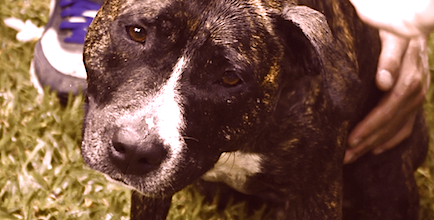In Defense of Cross-Posters: Like It or Not, We’re Saving Animals’ Lives
I am proud to be a Facebook cross-poster because it works. Posting photo after photo of needy dogs is better than doing nothing at all.

Cross-posting about shelter animals is a waste of time — and a nightmare to rescuers back “in the real world.” More than anything, cross-posting on social media just creates chaos and hysteria surrounding shelter animals.
Those aren’t my words. Those odd sentiments were spelled out in a controversial article by Heather Clarkson, republished here on Petful a few weeks ago.
To be perfectly clear, I don’t buy her argument. Let me explain why.

Don’t leave your pet’s safety to chance
Sign up for Petful recall alerts today.

Cross-Posting Is NOT Bad
First, I want to say that it’s easy to understand how empty comments such as “Someone do something!” and “Please save them!” — usually in all-caps, no less — can get under rescuers’ skin. I understand the frustration of being tagged endlessly by others. After all, you can only do so much.
However, any suggestion that the world of cross-posters is incompetent and a waste of time is way off base.
With the boom of Facebook, social media has introduced a whole new world of animal welfare awareness. In her article, Heather asserted that if an animal was available, the local rescues already knew about it. Sure, maybe for a small-town shelter that’s the case. But when you get to bigger cities, such as Atlanta where I live, there are so many animals in need that it can overwhelm even the most diligent rescuer.
In some cases when I have cross-posted, rescuers have told me, “I didn’t even know that baby was there!”
Lisa Smith-Elyea left a comment on Heather’s article wondering why Heather was being so hostile. Lisa shared not 1 but 2 reasons why she’s an unabashed cross-poster. First, she said, “If it were not for cross-posting, I wouldn’t have the dog I do now.” Second, she “recently found a missing dog, and thanks to cross-posting, the owner was able to get in touch.”
In other words, cross-posting WORKS.
Heather would have us reduce the chances of animals who may come up with little time left or may be too shy for a photo and end up being shown online at the last minute. Many times a rescue specializing in a specific breed will take dogs from another organization. Cross-posters like me post this information to those rescues to ease the burden locally for other animals.
Tag, You’re It
OK, now let’s talk about tagging. Is it really so wrong?
Heather says, “That’s my Facebook page! For me!” — complaining about people tagging her name too frequently on photos of needy dogs, all of which pollutes her personal Facebook page.
So what?
Let me ask her this: Given that you’re an animal lover and rescuer, aren’t all those dogs part of who you are?
For me, as a proud Facebook cross-poster, they are. Sure, I still post about my friends, my family, my grandchildren and politics, of course — but those dogs ALWAYS have a place on my page. (Confession: I have lost a number of friends because of cross-posting dogs and begging for donations or to ask if anyone can help. My reaction? See you later.)
Bottom line: If you have an issue with being tagged for many animals or having these things appear on your page, you’re in the wrong business. Yes, it can be overwhelming. However, if you tell others you are at your limit mentally or emotionally, most cross-posters will understand and respect that fact.
This Is a Slap in the Face
To tell cross-posters to “get off your butt … and from behind the computer” is a slap in the face considering what we are accomplishing every day via social media.
A single click by sharing can save a life!
It can mean raising much more money for a rescue. It can mean finding someone locally to adopt that dog — someone who wouldn’t have seen the dog if not for a friend of a friend (of a friend) posting about it and sharing it.
Maybe anti–cross-posters like Heather don’t understand that many people aren’t able to volunteer because of physical limitations or other perfectly good reasons. We may be at our limit for dogs, or broke as hell because we have our own rescued dogs. Not fostering makes us responsible dog caretakers.
Saying we should do more when we can’t makes it seem as if our efforts mean nothing.
I Won’t Be Made to Feel Guilty — Will You?
Many rescues exist on donations alone. Vetting is extremely expensive. A simple donation of just $5 each from 100 people can make an enormous difference to any animal in need.
Can rescuers do that in a single day by handing out fliers or going door to door? Not really. In the time it takes, that dog could die. The truth is this: Computers, cross-posters and online donations all make it more efficient and ease the burden on the rescuer to focus on what matters — actually getting that dog out.
For my birthday one year, I asked my Facebook friends to donate to their own favorite shelter. A woman in North Carolina sent me a huge box of items she had chosen from the wish list for my local shelter. I delivered it with the help of my husband. Without social media, that generous gift never would have happened.
I have dealt with people who, like Heather, have been angered because I could not foster or volunteer or “do more.” I know my physical limits as well as my resources. I cross-post. That is all I can do, and it’s better than nothing at all.
I refuse to feel guilty for that — and I go to bed at night knowing I have made a difference.
The sad fact is, we cannot save them all. I will do my best to save as many animals as I can in whatever small way possible, even if it means “only” being a cross-poster.
* * *
This article was written by Jody Provost, a writer, animal advocate and seamstress who strives to raise awareness of multiple social issues. Married with 2 children, 2 grandchildren and her own rescued dogs, Jody is beginning to believe life began after 40.







